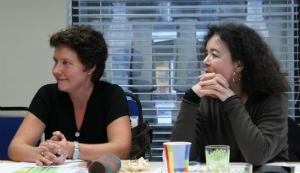It seems strange to begin a blog suggesting that face to face meetings are an important way of sharing research findings, but that was the conclusion I reached after our joint seminar between the Social Care Workforce Research Unit at King’s College London and researchers from the Welfare, Inequality and Life Course (VUL) work group based in the Department of Sociology at the University of Bergen, Norway.
The aim was to share our ideas and experiences. Academics are sometimes accused of working in ivory towers. This could not be said of Liv Johanne Syltevik, Kjetil Lundberg, Ann Nilsen, Bo Vignes and Karen Christensen who arrived at the Unit hotfoot from a visit to Hounslow Job Centre Plus. Liv and Kjetil explained that the visit was part of their research looking at the impact of the merger of former employment and social insurance services into a single Norwegian Labour and Welfare Administration (NAV). Martin Stevens and Jess Harris then spoke about the Jobs First project which looks at how people with learning disabilities can be supported to enter employment.
The two presentations highlighted how different terms can reflect deeper differences between welfare regimes. In Norway, where most citizens would expect to receive support and assistance from the NAV over the life course, people in contact with the service are described as ‘users’. In the UK, people using Job Centre Plus are described as ‘customers’ although, for many, paid work is a form of consumption they will not experience. In a further irony, we heard how Norwegian unemployment rates are much lower compared with the UK.

Prof. Karen Christensen (left), who chaired the seminar at the Unit on 26 September, is Visiting Research Fellow at King’s. With Prof. Ann Nilsen
We talked about similarities too; in the use of mixed methods in research about transitions to adulthood and family carers and how older migrants in both countries often face similar issues. Karen mentioned the possibility that people might take up transnational care careers, working in the sector in different countries. As Shereen Hussein explained her analysis showing how some care workers in England earn less than the national minimum wage, I started wondering how average care worker wages compare across the European Economic Area.
You can learn a lot about the ways in which different countries organise care and support by reading journal articles and attending conferences. However, at conferences, time for discussion is often limited. This is generally because of the need to negotiate labyrinthine venues. I once attended a conference where you needed to be a time traveller to go to the place where refreshments were served and return to the building where presentations were taking place in time for the next session. We’re increasingly aware of the potential for researchers and practitioners from different countries to use social media for discussion. However, there is something about meeting face to face that promotes dialogue. It’s also much nicer to eat real homemade cake and muffins than to experience them virtually! We are all looking forward to keeping in touch and building connections between the two units.
Jo Moriarty is a Research Fellow at the Social Care Workforce Research Unit at King’s College London and tweets as @Aspirantdiva. Jo’s study of family carers, which she introduced at the seminar, has started reporting.

Bo Vignes, Kjetil Lundberg, Prof. Jill Manthorpe (Director of SCWRU), Prof. Liv Johanne Syltevik, Prof. Karen Christensen and Prof. Ann Nilsen



